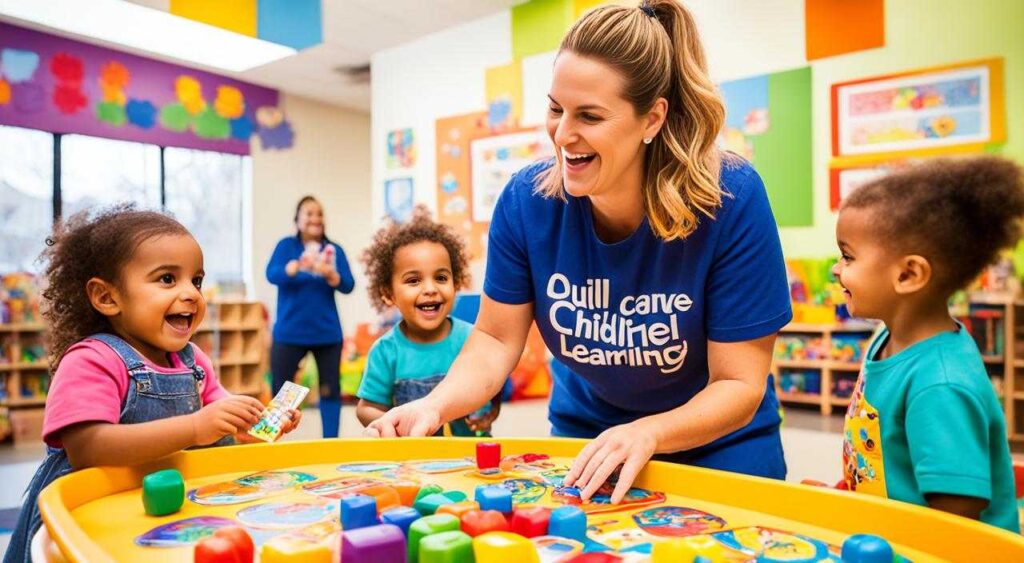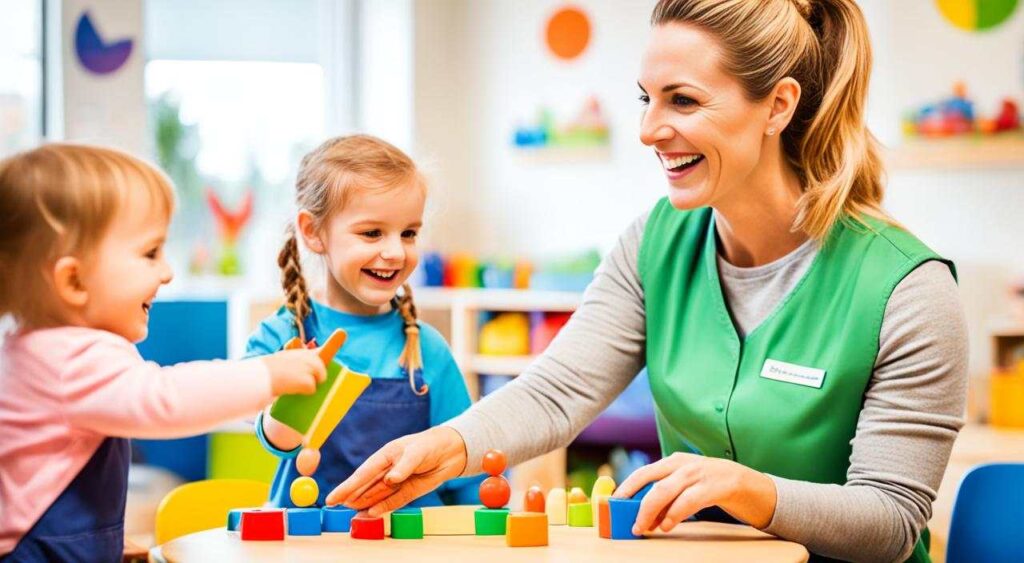If you love helping young minds grow but don’t have a college degree, don’t worry. You can still start a career in childcare. This guide will show you how to find a rewarding childcare job without a formal education. It’s designed to use your natural talents and love for teaching kids. Here, you’ll learn how to become a childcare worker without a college degree. So, whether you want to work in a busy daycare or as a nanny, your journey to impact children’s lives starts now.
Key Takeaways
- Learn about the multiple pathways to starting a career in childcare without a traditional degree.
- Discover alternative educational opportunities, like getting an Early Childhood Education certificate, that can bolster your appeal to employers.
- Understand the importance of practical experience and where to seek volunteer opportunities.
- Gain insight into the essential qualities and skills prized in the childcare arena.
- Grasp the significance of crafting a standout resume tailored to childcare jobs.
- Prepare for the interview process with confidence and know-how specific to the childcare worker role.
- Recognize the crucial role of professional development and stay informed about state regulations impacting childcare providers.
Exploring Careers in Childcare: Is It Right for You?
Many people see a career in childcare as more than just a job it’s their passion. If you adore working with kids, the childcare profession has many roles to fill your need to impact children positively. It’s important to understand different childcare worker roles and their duties.
Careers in childcare cover a wide range. This includes daycare workers, nannies, preschool teachers, and after-school program coordinators. These roles are crucial during the early growth stages of kids. They need a special skill set and dedication.
- Daycare Workers: They create a safe, caring space for kids while leading educational activities.
- Nannies: Working usually in homes, nannies care for kids and organize their daily activities.
- Preschool Teachers: They focus on early learning, preparing kids for future education.
The Bureau of Labor Statistics says childcare job prospects are growing. As more families need childcare, jobs in various places from schools to homes are increasing.
| Role | Responsibilities | Job Prospects |
|---|---|---|
| Daycare Worker | Supervision, activity planning, educational support | Rising demand in daycare centers |
| Nanny | Individual childcare, activity coordination, travel support | Increased opportunities for in-home care |
| Preschool Teacher | Curriculum development, foundational education, child assessment | Growth expected due to emphasis on early childhood education |
If you are thinking of the childcare profession for your career? Remember, it’s rewarding to shape young minds. Understanding various roles will help guide you in this fulfilling field.

How to Become a Childcare Worker Without a Degree
Getting a job as a career in childcare without a degree is rewarding yet challenging. It’s important to learn the skills and knowledge needed for caring for kids. In this part, we will look at steps to help you start in childcare. You can work in this field without a degree and even get certifications.
Earn an ECE Certificate
Get an Early Childhood Education (ECE) certificate. This certification covers child development and industry best practices. You can find ECE programs at community colleges or special education centers. They offer flexible schedules. Having this certification shows your dedication to learning and boosts your job qualifications.
Volunteer to Gain Experience
Hands-on experience is crucial in childcare. Try volunteering at local daycare centers or after-school programs. It helps you learn through practice. You’ll experience different childcare settings. This helps you understand child behavior and care techniques better.
Develop and Showcase Essential Skills
Childcare workers need a mix of skills to be successful. These include patience, creativity, problem-solving, and good communication. It’s important to develop and show these skills. You could join workshops on communication or creative teaching. These skills make you stand out as a candidate and work well with children.
Whether it’s taking ECE courses, volunteering, or improving your skills, a career in childcare is achievable. Focus on getting certifications, practical experience, and developing key skills. With dedication, you can be a successful childcare worker without a degree.

Key Qualities of Successful Childcare Workers
Starting a career in childcare involves a mix of personal and professional qualities. It’s key to know these traits to excel and provide top care. We’ll explore what makes successful childcare workers stand out. This includes how to highlight these traits in your resume and job interviews for childcare positions.
Crafting a Compelling Resume
Your resume should highlight important childcare worker qualities along with your experience and education. Employers seek candidates who are not just qualified but also show compassion, patience, and creativity. Ensure your resume displays these skills for childcare workers. Include examples of work with kids, relevant training or certifications, and how you’ve excelled in past roles.
Clearly show how you’ve applied your skills. This could be through structured play, solving problems, or enhancing learning. For instance, structure your resume to detail your experiences and their impact.
| Experience/Certification | Description | Impact/Outcome |
|---|---|---|
| Early Childhood Education Certificate | Gained comprehensive knowledge of child development stages and effective teaching strategies. | Developed a learning module that improved language skills among preschoolers by 20%. |
| Behavior Management Training | Learned advanced techniques for managing a variety of behaviors in children aged 2-5. | Reduced incidents of disruptive behavior in a classroom of 30 children by implementing positive reinforcement strategies. |
| Volunteer Work | Coordinated after-school activities for children in a local community center. | Increased regular attendance of the program by 40% through engaging and culturally responsive activities. |
Acing the Interview with Confidence
Cracking an interview is just the beginning. Next, you must show confidence and purpose. In giving interview tips for childcare jobs, it’s advised to reflect essential childcare worker traits in your answers. Share your knowledge of childcare, with stories of your dedication to children’s growth and welfare.
- Research the institution’s values and ethos, aligning your answers to showcase a match in philosophy.
- Practice responses to common interview questions, focusing on scenarios where your proactive nature and aptitude for creating nurturing environments shone through.
- Communicate your passion for child well-being and education by discussing past experiences and learning moments.
In the interview, remember that how you look and act matters too. Dress smartly, keep eye contact, and shake hands firmly to show confidence. Cap it off with a thoughtful thank you note, leaving a great impression.
Having the qualities of good childcare workers and knowing how to show them in your resume and interview are key to a bright career in childcare.
Understanding Licenses and Regulations
The childcare world is full of rules to protect kids in professional care. Knowing about childcare licensing and state childcare regulations makes a care provider trustworthy. It also creates a safe place for kids to grow.
Navigating State Childcare Licensing
In the U.S., childcare laws vary by state. Those in childcare need to follow these rules to get and keep a license. This process includes filling out detailed forms, gathering documents, and passing inspections. Here’s a brief overview:
- Application Submission: Forms must detail personal and program information, including any legal issues.
- Documentation: Proof of qualifications and following state rules like caregiver-to-child ratios and safety policies.
- Inspections and Compliance: Regular checks to ensure ongoing adherence to safety and educational standards.
These steps can seem tough, but help is available. Many resources guide through state-specific requirements.
Health and Safety Standards in Childcare
Keeping children safe and healthy is critical in childcare. The sector follows strict health and safety regulations. These cover immunizations, first-aid and CPR skills, emergency plans, and ensuring a safe and supportive environment for kids.
Ongoing Professional Development
Continuous learning is key in childcare. It’s about going above basic requirements to provide the best care. Workers can improve through:
- Continuing Education: Taking additional courses or training to enhance their skills.
- Workshops and Seminars: Learning about new childcare methods and technologies.
- Conferences and Networking: Connecting with others in the field to share ideas.
This commitment to growth improves childcare quality and sets high standards.
| Aspect of Professional Development | Benefits | Resources for Access |
|---|---|---|
| Educational Advancement | Keeps providers current with best practices and pedagogy | Online courses, local colleges, and universities |
| Health and Safety Training | Prepares providers for emergencies and upholds safety standards | Red Cross, American Heart Association, state-sponsored programs |
| Networking Events | Facilitates the exchange of ideas and experiences with other professionals | Conferences, professional childcare associations, online forums |
Getting involved in childcare licensing, following state childcare regulations, and pursuing professional development helps caregivers improve their skills. This leads to better care in their educational spaces.
Conclusion
To become a childcare worker without a degree, we’ve gone through many steps. Getting an Early Childhood Education (ECE) certificate is key. It helps you learn a lot and grow in this important job. Volunteering gives you real-world experience that classrooms can’t.
We also talked about improving yourself. Making a unique resume shows employers your skills and love for the job. Being good at interviews helps you find opportunities to teach and take care of kids. It’s important to know and follow all the rules for the kids’ safety.
Never stop learning about childcare. This makes you better at your job and helps the kids more. Using what you’ve learned from this article can make your career in childcare great, even without a degree. Working hard in these areas helps not just you but the kids and society too.
You may like:
How to become a recruiter without a degree
How to become a certified counselor without a degree
How to become a virtual assistant without a degree
FAQ
Can I become a childcare worker without a degree?
Yes, you can start a career in childcare without a degree. You just need the right skills and experience from different paths.
What careers are available in childcare?
In childcare, you can work as a daycare worker, a nanny, or a preschool teacher. Each job has its own duties and opportunities.
How can I become a childcare worker without a degree?
To work in childcare without a degree, you can get an Early Childhood Education (ECE) certificate. Also, volunteer to gain experience and develop key skills.
What is an Early Childhood Education (ECE) certificate?
An ECE certificate is a program that teaches you the basics of working with young kids.
How can volunteering help me become a childcare worker?
By volunteering, you learn hands-on skills, understand child development, and meet industry professionals.
What essential skills do childcare workers need?
Good childcare workers need to communicate well, solve problems, be creative, and have patience. You can improve these skills and talk about them in your resume or interviews.
How can I craft a compelling resume for a childcare job?
Make your resume stand out by focusing on your childcare experience, skills, and achievements.
How can I prepare for a childcare job interview?
Get ready for your childcare job interview by learning about the organization. Practice answering common questions and show your love for working with kids.
What licenses and regulations do childcare workers need to follow?
To keep kids safe and healthy, childcare providers must follow certain licenses and rules.
Why is ongoing professional development important for childcare workers?
Continuous learning is important for childcare workers. It keeps them updated on best practices and improves their skills.
